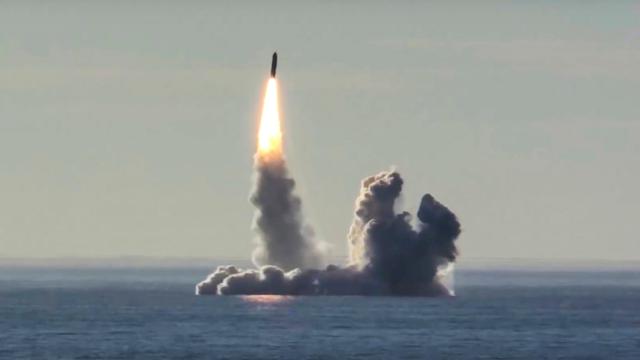The Russian military is searching for a “nuclear-powered” missile that it lost at sea, at least according to anonymous US intelligence sources who spoke to CNBC.
According to CNBC, those sources said Russia tested four of the missiles, which are reportedly called Burevestniks, between November 2017 and February 2018.
But President Vladimir Putin’s boasting earlier this year that the prototypes could “attack any target” at any range appears to have been somewhat premature. The sources said all four tests failed, with Russia’s best attempt lasting a pitiful two minutes and covering just 35km, and the nuclear core failing to activate mid-flight.
CNBC wrote the Russians are not particularly happy about this and are trying to recover one of the lost missiles:
Crews will attempt to recover a missile that was test launched in November and landed in the Barents Sea, which is located north of Norway and Russia. The operation will include three vessels, one of which is equipped to handle radioactive material from the weapon’s nuclear core. There is no timeline for the mission, according to the people with knowledge of the report.
The US intelligence report did not mention any potential health or environmental risks posed by possible damage to the missile’s nuclear reactor.
(There is no reason to worry about the possibility of a nuclear warhead being on board.)
As Task and Purpose noted, the US military may be looking for the lost missiles too: The Air Force flew “nuclear-sniffing WC-135 ‘Constant Phoenix’ aircraft” over the Barents and Baltic Seas from March to August 2018.
If true, these tests might not have been Russia’s best idea. The Russian military already controls an absurdly powerful nuclear deterrent that is more than capable of destroying whatever it’s aimed at. So to a large extent building fancy new ones is showboating… With a prototype missile supposedly carrying an unknown quantity of radioactive fuel.
Even in the cases of large releases of radioactive contaminants into the ocean, such as the Fukushima nuclear power plant disaster, the ocean is pretty good at diluting it to the point where it does not cause widespread ecological damage. So that’s good.
But the Federation of American Scientists’ Nuclear Information Project director Hans Kristensen told The Verge that the possible harm to personnel involved in handling or recovering radioactive material was one reason the US abandoned experiments with nuclear-powered cruise missiles in the 1950s-1960s, because “it was too complex and messy, and of course, once you fly this thing, sooner or later it’s going to land — and then you have that problem with radioactive pollution”.
“If this missile was lost at sea and recovered in full, then you might hypothetically be able to do it without pollution, I would have my doubts about that because it’s a very forceful impact when the missile crashes,” Kristensen told CNBC. “I would suspect you would have leaks from it.”
[CNBC]
